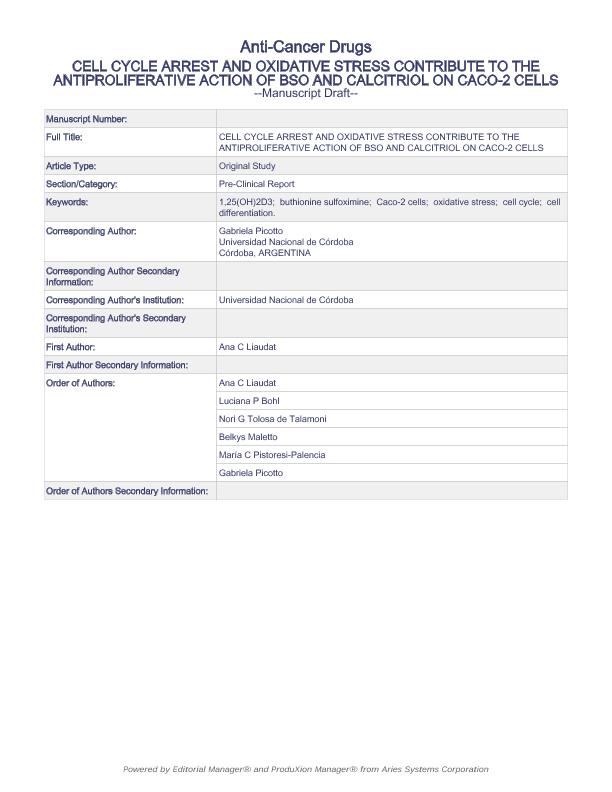Mostrar el registro sencillo del ítem
dc.contributor.author
Liaudat, Ana Cecilia

dc.contributor.author
Bohl, Luciana Paola

dc.contributor.author
Tolosa, Nori Graciela

dc.contributor.author
Maletto, Belkys Angélica

dc.contributor.author
Pistoresi, Maria Cristina

dc.contributor.author
Picotto, Gabriela

dc.date.available
2018-01-02T14:56:23Z
dc.date.issued
2014-08
dc.identifier.citation
Picotto, Gabriela; Liaudat, Ana Cecilia; Pistoresi, Maria Cristina; Maletto, Belkys Angélica; Tolosa, Nori Graciela; Bohl, Luciana Paola; et al.; Oxidative stress, cell cycle arrest and differentiation contribute toward the antiproliferative action of BSO and calcitriol on Caco-2 cells; Lippincott Williams; Anticancer Drugs; 25; 7; 8-2014; 810-818
dc.identifier.issn
0959-4973
dc.identifier.uri
http://hdl.handle.net/11336/31962
dc.description.abstract
The prognosis and incidence of colon cancer are linked to vitamin D3 serum levels. To evaluate the effects of D,L-buthionine-S,R-sulfoximine (BSO), 1,25(OH)2D3 and their combination on intestinal Caco-2 cell growth, to elucidate the possible cellular mechanisms involved in their antiproliferative action, and to determine whether BSO acts as a sensitizer to 1,25(OH)2D3 treatment, enabling minimization of the toxic effects caused by high doses of the steroid. Human colon cancer Caco-2 cells were treated with 1,25(OH)2D3, BSO, both, or vehicle. Cell proliferation was evaluated by crystal violet staining. Cell cycle and mitochondrial membrane potential were measured by flow cytometry. Total glutathione, catalase, superoxide dismutase, superoxide anion levels, and alkaline phosphatase activities were analyzed by spectrophotometry. DNA fragmentation was evaluated using the terminal dUTP nick end labeling assay. BSO and 1,25(OH)2D3 inhibited Caco-2 cell growth, an effect that was higher with the combined treatment. The antiproliferative effect produced by the combination could be protected by ascorbic acid. BSO plus 1,25(OH)2D3 induced cell cycle arrest and suppressed cell division. Total glutathione decreased and superoxide anion increased with BSO and BSO plus 1,25(OH)2D3. Catalase activity increased with the combined treatment. Mitochondrial membrane potential and alkaline phosphatase activity were altered by 1,25(OH)2D3 alone or plus BSO. The percentage of terminal dUTP nick end labeling-positive cells was increased. BSO increases the antiproliferative effect of 1,25(OH)2D3 on Caco-2 cells through induction of oxidative stress, which occurs simultaneously with DNA breakage. The antioxidant system can partially compensate the damage induced by BSO plus 1,25(OH)2D3. Cell differentiation induction is also involved in the response to the combined treatment.
dc.format
application/pdf
dc.language.iso
eng
dc.publisher
Lippincott Williams

dc.rights
info:eu-repo/semantics/openAccess
dc.rights.uri
https://creativecommons.org/licenses/by-nc-sa/2.5/ar/
dc.subject
1,25(Oh)2d3
dc.subject
Buthionine Sulfoximine
dc.subject
Caco-2 Cells
dc.subject
Oxidative Stress
dc.subject
Cell Cycle
dc.subject
Celldifferentiation
dc.subject.classification
Salud Ocupacional

dc.subject.classification
Ciencias de la Salud

dc.subject.classification
CIENCIAS MÉDICAS Y DE LA SALUD

dc.title
Oxidative stress, cell cycle arrest and differentiation contribute toward the antiproliferative action of BSO and calcitriol on Caco-2 cells
dc.type
info:eu-repo/semantics/article
dc.type
info:ar-repo/semantics/artículo
dc.type
info:eu-repo/semantics/publishedVersion
dc.date.updated
2017-12-28T17:47:19Z
dc.journal.volume
25
dc.journal.number
7
dc.journal.pagination
810-818
dc.journal.pais
Estados Unidos

dc.journal.ciudad
Philadelphia
dc.description.fil
Fil: Liaudat, Ana Cecilia. Consejo Nacional de Investigaciones Científicas y Técnicas. Centro Científico Tecnológico Conicet - Córdoba. Instituto de Investigaciones en Ciencias de la Salud. Universidad Nacional de Córdoba. Instituto de Investigaciones en Ciencias de la Salud; Argentina
dc.description.fil
Fil: Bohl, Luciana Paola. Consejo Nacional de Investigaciones Científicas y Técnicas. Centro Científico Tecnológico Conicet - Córdoba. Instituto de Investigaciones en Ciencias de la Salud. Universidad Nacional de Córdoba. Instituto de Investigaciones en Ciencias de la Salud; Argentina
dc.description.fil
Fil: Tolosa, Nori Graciela. Consejo Nacional de Investigaciones Científicas y Técnicas. Centro Científico Tecnológico Conicet - Córdoba. Instituto de Investigaciones en Ciencias de la Salud. Universidad Nacional de Córdoba. Instituto de Investigaciones en Ciencias de la Salud; Argentina
dc.description.fil
Fil: Maletto, Belkys Angélica. Consejo Nacional de Investigaciones Científicas y Técnicas. Centro Científico Tecnológico Córdoba. Centro de Investigaciones en Bioquímica Clínica e Inmunología; Argentina
dc.description.fil
Fil: Pistoresi, Maria Cristina. Consejo Nacional de Investigaciones Científicas y Técnicas. Centro Científico Tecnológico Córdoba. Centro de Investigaciones en Bioquímica Clínica e Inmunología; Argentina
dc.description.fil
Fil: Picotto, Gabriela. Consejo Nacional de Investigaciones Científicas y Técnicas. Centro Científico Tecnológico Conicet - Córdoba. Instituto de Investigaciones en Ciencias de la Salud. Universidad Nacional de Córdoba. Instituto de Investigaciones en Ciencias de la Salud; Argentina
dc.journal.title
Anticancer Drugs

dc.relation.alternativeid
info:eu-repo/semantics/altIdentifier/doi/http://dx.doi.org/10.1097/CAD.0000000000000109
dc.relation.alternativeid
info:eu-repo/semantics/altIdentifier/url/http://journals.lww.com/anti-cancerdrugs/pages/articleviewer.aspx?year=2014&issue=08000&article=00008&type=abstract
Archivos asociados
